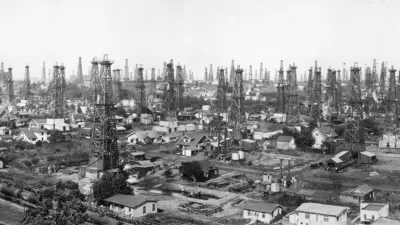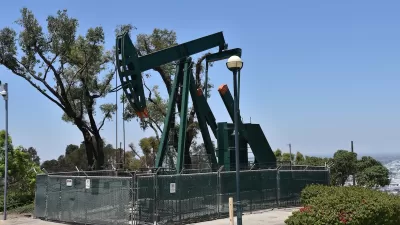California's oil industry has withdrawn its ballot measure challenging a law that restricts oil and gas wells near homes and schools, opting to contest the law in court.

California’s oil industry has withdrawn its controversial ballot measure that aimed to challenge a state law banning new oil and gas wells within 3,200 feet of homes and schools, opting instead to fight the legislation in court. As reported by Julie Cart, this decision means that the protective measures outlined in Senate Bill 1137, signed by Governor Gavin Newsom, will go into effect, ensuring safety improvements for existing wells and prohibiting new drilling in sensitive areas. Environmentalists see this as a significant victory, while the oil industry argues that the law will lead to job losses, increased gas prices, and greater reliance on imported oil.
Authored by Senator Lena Gonzalez, the law mandates that operators of existing wells near homes and schools develop safety plans by 2025 and implement them by 2027. The California Independent Petroleum Association, represented by Jonathan Gregory, stated that while public claims against the referendum could be made without evidence, the courts would require substantiated proof, hence the shift from a referendum to a legal strategy. Governor Newsom praised the withdrawal as a win for public health and safety, emphasizing the importance of keeping drilling operations away from vulnerable communities and populations.
Environmental health risks from oil operations have been a longstanding concern, particularly for the 2.5 million Californians living within 3,200 feet of wells, many of whom are from low-income and predominantly communities of color. The harmful effects include respiratory issues, heart disease, and higher cancer rates. Mabel Tsang of the California Environmental Justice Alliance highlighted the generational health impacts suffered by these communities, reinforcing the necessity of the new regulations.
Despite this victory, the oil industry continues to oppose various legislative efforts aimed at regulating and cleaning up abandoned wells. Assemblymember Isaac Bryan, who helped negotiate the withdrawal, remains critical of the industry's legal challenges and committed to advancing related bills. Environmental activists, undeterred by the industry's tactics, vow to persist in their efforts to protect public health and the environment.
FULL STORY: Controversial measure overturning oil well restrictions won’t be on California ballot

Trump Administration Could Effectively End Housing Voucher Program
Federal officials are eyeing major cuts to the Section 8 program that helps millions of low-income households pay rent.

Planetizen Federal Action Tracker
A weekly monitor of how Trump’s orders and actions are impacting planners and planning in America.

Ken Jennings Launches Transit Web Series
The Jeopardy champ wants you to ride public transit.

Rebuilding Smarter: How LA County Is Guiding Fire-Ravaged Communities Toward Resilience
Los Angeles County is leading a coordinated effort to help fire-impacted communities rebuild with resilience by providing recovery resources, promoting fire-wise design, and aligning reconstruction with broader sustainability and climate goals.

When Borders Blur: Regional Collaboration in Action
As regional challenges outgrow city boundaries, “When Borders Blur” explores how cross-jurisdictional collaboration can drive smarter, more resilient urban planning, sharing real-world lessons from thriving partnerships across North America.

Philadelphia Is Expanding its Network of Roundabouts
Roundabouts are widely shown to decrease traffic speed, reduce congestion, and improve efficiency.
Urban Design for Planners 1: Software Tools
This six-course series explores essential urban design concepts using open source software and equips planners with the tools they need to participate fully in the urban design process.
Planning for Universal Design
Learn the tools for implementing Universal Design in planning regulations.
Ada County Highway District
Clanton & Associates, Inc.
Jessamine County Fiscal Court
Institute for Housing and Urban Development Studies (IHS)
City of Grandview
Harvard GSD Executive Education
Toledo-Lucas County Plan Commissions
Salt Lake City
NYU Wagner Graduate School of Public Service





























